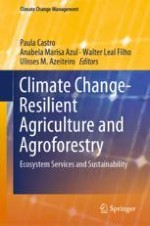2019 | OriginalPaper | Buchkapitel
Alien Plant Species: Environmental Risks in Agricultural and Agro-Forest Landscapes Under Climate Change
verfasst von : Joana R. Vicente, Ana Sofia Vaz, Ana Isabel Queiroz, Ana R. Buchadas, Antoine Guisan, Christoph Kueffer, Elizabete Marchante, Hélia Marchante, João A. Cabral, Maike Nesper, Olivier Broennimann, Oscar Godoy, Paulo Alves, Pilar Castro-Díez, Renato Henriques, João P. Honrado
Erschienen in: Climate Change-Resilient Agriculture and Agroforestry
Aktivieren Sie unsere intelligente Suche, um passende Fachinhalte oder Patente zu finden.
Wählen Sie Textabschnitte aus um mit Künstlicher Intelligenz passenden Patente zu finden. powered by
Markieren Sie Textabschnitte, um KI-gestützt weitere passende Inhalte zu finden. powered by
